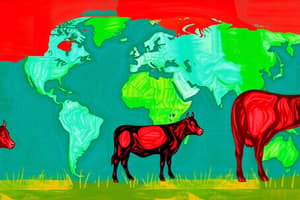Podcast
Questions and Answers
What percentage of the world's available freshwater is used in agriculture?
What percentage of the world's available freshwater is used in agriculture?
- 90%
- 50%
- 80%
- 70% (correct)
Which of the following meats has the highest water footprint?
Which of the following meats has the highest water footprint?
- Beef (correct)
- Lamb
- Chicken
- Pork
What is the approximate amount of water used to produce 1 kg of rice?
What is the approximate amount of water used to produce 1 kg of rice?
- 3,400 liters (correct)
- 2,500 liters
- 5,000 liters
- 1,000 liters
What is a major concern related to industrial livestock production?
What is a major concern related to industrial livestock production?
What is driving the call for change in industrial livestock production?
What is driving the call for change in industrial livestock production?
What is a goal of plans related to industrial livestock production?
What is a goal of plans related to industrial livestock production?
What is a significant consequence of concentrating animal wastes in industrial farming systems?
What is a significant consequence of concentrating animal wastes in industrial farming systems?
What is a major concern regarding the use of antibiotics in industrial farming systems?
What is a major concern regarding the use of antibiotics in industrial farming systems?
What is a contributing factor to the increase in greenhouse gas production and climate change?
What is a contributing factor to the increase in greenhouse gas production and climate change?
What is the estimated global meat production in 2013?
What is the estimated global meat production in 2013?
What is the forecasted growth rate of global meat production in 2014?
What is the forecasted growth rate of global meat production in 2014?
What is a consequence of industrial livestock production on land and water resources?
What is a consequence of industrial livestock production on land and water resources?
What is a characteristic of industrialized farming systems?
What is a characteristic of industrialized farming systems?
What is a concern regarding the treatment of human infections in relation to industrial farming systems?
What is a concern regarding the treatment of human infections in relation to industrial farming systems?
Which country had the highest meat consumption per person in 2011?
Which country had the highest meat consumption per person in 2011?
What percentage of Germans' meat consumption is made up of pork?
What percentage of Germans' meat consumption is made up of pork?
Which type of meat requires the most farmland to produce?
Which type of meat requires the most farmland to produce?
How much of the world's agricultural land is used for livestock pasture?
How much of the world's agricultural land is used for livestock pasture?
What is the estimated annual antibiotic use for livestock farming in Europe?
What is the estimated annual antibiotic use for livestock farming in Europe?
What percentage of the world's grain production is fed to livestock annually?
What percentage of the world's grain production is fed to livestock annually?
Which type of meat represents the most consumed meat by Saudi Arabians?
Which type of meat represents the most consumed meat by Saudi Arabians?
How does feeding livestock with grain compete with human food needs?
How does feeding livestock with grain compete with human food needs?
Flashcards are hidden until you start studying
Study Notes
Global Meat Consumption
- People in New Zealand consume the most meat per person (126.7 kg) followed by Australians (121.1 kg) in 2011.
- In contrast, people in Bangladesh and India consume only around 4 kg of meat per person.
- The Chinese consume almost 14 times as much meat per person as Indians.
Type of Meat Consumed
- Argentinians consume 54% beef, Germans consume 61% pork, and Saudi Arabians consume 74% poultry.
Antibiotic Use
- In 2011, the US used 13,600 tons of antibiotics for livestock, Europe used 8,500 tons, and China used over 100,000 tons.
- In China, more antibiotics are used for livestock than for treating ill people (3,500 tons).
Land Use
- Around 70% of agricultural land is used for animal pasture, and 10% for growing grains fed to livestock.
- Beef production requires 3-5 times more land than pork or chicken to produce the same amount of protein.
- Beef uses about 3/5 of global farmland but yields less than 5% of the world’s protein and less than 2% of its calories.
Grain Use
- Around 800 million tons of wheat, oats, rye, and corn are fed to animals annually, accounting for over 40% of world production.
- Additionally, 250 million tons of soybeans and other oilseeds are fed to livestock annually.
Water Use
- Agriculture uses about 70% of the world’s available freshwater, with one-third of that used to grow grain for livestock.
- Producing 1 kg of beef requires over 15,000 liters of water, much more than required for other staple foods like rice, eggs, milk, or potatoes.
Disadvantages of Industrial Livestock Production
- Soil and water pollution due to concentrated animal wastes and deforestation.
- Antibiotic-resistant bacteria due to excessive antibiotic use in industrialized systems.
- Strains on land and water resources, contributing to climate change and greenhouse gas production.
Studying That Suits You
Use AI to generate personalized quizzes and flashcards to suit your learning preferences.




